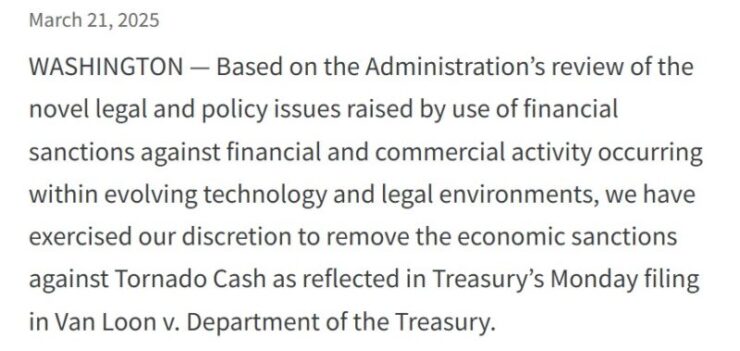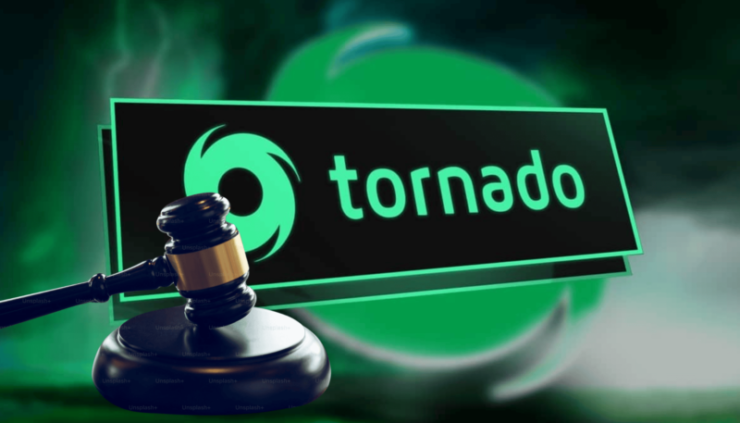The U.S. Treasury Department has formally lifted sanctions imposed on Tornado Cash, the cryptocurrency mixer previously accused of aiding North Korean-linked laundering operations. The removal, announced Friday, effectively clears the Ethereum-based platform from the Office of Foreign Assets Control’s (OFAC) Specially Designated Nationals (SDN) list, reversing actions first taken in 2022.
Tornado Cash was sanctioned after authorities alleged it facilitated laundering of digital assets tied to cyberattacks by North Korea’s Lazarus Group. The sanctions barred U.S. persons and entities from transacting with the platform, citing national security concerns over illicit fund flows.
However, the Treasury’s position faced significant legal opposition. A federal appeals court ruled last November that OFAC lacked authority to sanction Tornado Cash’s smart contracts, determining they could not be classified as the “property” of any designated foreign individual or entity. This legal setback undermined the foundation of the sanctions, prompting a reassessment of enforcement measures.

Despite the rollback, Treasury officials maintain that North Korea’s cyber-financial operations remain an ongoing threat. In a statement accompanying the delisting, the department reiterated its commitment to countering state-sponsored hacking campaigns and illicit finance activity connected to the Democratic People’s Republic of Korea (DPRK). Officials pointed specifically to recent thefts, including the $1.4 billion Bybit hack, which reportedly pushed North Korea’s crypto haul past holdings of countries like El Salvador and Bhutan.
“Treasury remains committed to using our authorities to expose and disrupt the ability of malicious cyber actors to profit from their criminal activities through the exploitation of digital assets and the digital assets ecosystem,” the release said.
“We are also committed to enforcing our sanctions against the DRPK to constrain the regime’s ability to fund its weapons of mass destruction and ballistic missile programs.”
Why Was Tornado Cash Sanctioned in the First Place?
Tornado Cash gained notoriety in 2022 when OFAC sanctioned it for allegedly helping launder more than $7 billion in illicit funds since its inception. Specifically, the U.S. government accused the mixer of enabling North Korean hacking group Lazarus to funnel millions of dollars worth of stolen crypto assets through its protocol. The sanctions extended not only to the developers behind Tornado Cash but also to the smart contracts themselves, effectively banning U.S. persons from interacting with the protocol.
This move sparked intense backlash from privacy advocates and crypto industry leaders, who argued that sanctioning open-source code and immutable smart contracts set a dangerous precedent. Several legal challenges ensued, including lawsuits claiming the sanctions violated constitutional rights such as free speech and due process.
Treasury Delists Over 100 Ethereum Addresses
In addition to lifting sanctions on Tornado Cash, the U.S. Treasury’s Office of Foreign Assets Control (OFAC) has removed more than 100 Ethereum wallet addresses from its Specially Designated Nationals (SDN) list, according to a newly published notice. These addresses, previously linked to Tornado Cash’s smart contracts, had been blacklisted under the same enforcement action.
Despite the reversal, the legal case against Tornado Cash’s developers remains active. Roman Storm, one of the protocol’s co-founders, is set to stand trial this July on charges related to his role in developing the platform. Federal prosecutors allege Storm conspired to violate sanctions by enabling transactions tied to sanctioned entities, including North Korea’s Lazarus Group. Another Tornado Cash developer has also been charged but has not been taken into custody.

Last November’s ruling from the Fifth Circuit Court of Appeals, which determined that Tornado Cash’s smart contracts could not be classified as property, prompted Storm’s legal team to seek dismissal of the charges. However, the Southern District of New York rejected that request in February, with Judge Katherine Polk Failla ruling that the court’s interpretation of Tornado Cash’s sanction status had no bearing on the underlying accusations regarding the Lazarus Group.
Treasury Secretary Scott Bessent reiterated the department’s broader enforcement priorities in a statement, emphasizing the ongoing need to prevent the misuse of digital assets by state-sponsored actors and criminal networks. The Treasury also signaled in recent filings that while Tornado Cash’s smart contracts have been removed from the sanctions list, enforcement actions targeting individuals and entities involved remain firmly in place.
“Treasury will continue to monitor closely any transactions that may benefit malicious cyber actors or the DPRK, and U.S. persons should exercise caution before engaging in transactions that present such risks,” the release added.
Quick Facts:
- The U.S. Treasury has officially removed sanctions on Tornado Cash, delisting its smart contracts and wallet addresses from OFAC’s SDN list.
- Tornado Cash was sanctioned in 2022 for allegedly facilitating over $7 billion in illicit transactions, including funds linked to North Korean hackers.
- Legal challenges and pressure from privacy advocates are believed to have influenced the decision to reverse the sanctions.





